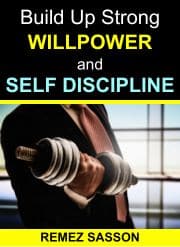
Anyone who has given a presentation knows that confidence plays a big role in public speaking. But confidence is not something most of carry around by the bucketful. For a speaker to face audiences again and again, they need to constantly work on their confidence game.
This confidence work has huge benefits in other areas of our lives, and not just when we need to deliver a wedding toast or boardroom presentation!
Here are three key coaching tips you can use to improve your confidence in all areas of your life.
1. Stand tall and proud
Browse our online courses on meditation, positive thinking, overcoming procrastination, and freedom from distractions.
Okay, maybe this first one isn’t so surprising, but it is so hugely important that it bears repeating.
Our posture tells a lot about ourselves to…ourselves!
Slouching, rounding the shoulders, collapsing in at the chest, and letting our head hang are all defensive, physically diminishing postures. Not only does this tell others that we are insecure or unconfident, it reinforces that message in our own mind.
Amy Cuddy’s famous TED talk on power poses brought to public awareness the real effect our body language has on our minds. But this technique has been well known to actors for ages – stand the way your character feels, and you will also feel that way.
Standing tall and proud is really about having good posture. This is not a rigid way of holding yourself – once you get the hang of it, it is the most comfortable, natural way to stand.
To stand with the confidence of a public speaker (whether you are one or not), follow these steps:
- 1)Place your feet shoulder width apart.
- Lightly engage your abdominal muscles, like you were getting ready to pick up a heavy box. Don’t crunch your abs in too hard – just engage them enough so they help support your torso.
- Let the centre point of your chest float effortlessly upwards. A “proud” chest is held high, not puffed out. This will help your shoulders drop down and back without straining.
- Balance your head evenly on your neck and keep your jaw parallel to the ground.
Try for a feeling of lightness and balance in your whole body. It doesn’t matter what size or shape you may be; anyone can hold themselves lightly and proudly, and it has a very real affect in your actual sense of pride and confidence.
2. Eliminate subtle self-deprecation
We’ve all heard the advice to celebrate our abilities, and it is good advice. This confidence booster takes it further.
Too often we try to “balance out” confident statements by then thinking or saying something negative or diminishing.
Most of us don’t realize how frequently we acknowledge our abilities with one hand while putting ourselves down with the other.
Usually, we’re trying to be humble or avoid bragging, but all we’re really doing is stealing our own thunder and cutting down our confidence.
When you are talking or thinking about your good qualities, eliminate all words that take away from that compliment or that ability.
Instead of saying “I’m not the best writer out there, but that was a pretty good article,” tell yourself “I wrote a good article.” Both statements acknowledge your skill, but the first one couches it in subtle downtalk. The second statement presents your skill as straightforward, honest fact, which is much more empowering.
Be vigilant: sometimes confidence-stealing, self-deprecating language can be sneaky. It likes to disguise itself as humour: “Yup, that was a great budget, but don’t worry…I’ll make up for it with a lousy report!”
It can also hide itself in small, innocuous words: “I’m a pretty good cook” or “Yeah, that was an okay presentation” instead of “I make a mean beef stew” or “I gave a solid presentation.”
3. Be relentlessly curious
This tactic is all about viewing a failure or a lack of knowledge as an opportunity to learn something new rather than a reason to beat yourself up.
While we know on an intellectual level that we can’t have all the answers, admitting it can be a tough pill to swallow.
Many people will unnecessarily punish themselves when they can’t answer a question or are unable to do a skill or task that seems to come naturally to someone else. And this rocks our confidence.
It’s hard to feel good about ourselves when we’re busy kicking our own backsides for not being perfect.
But viewing a gap in skill or knowledge as an opportunity to learn something new and interesting can break this negative blame-game. Instead of dwelling on negative thoughts like “I can’t believe I couldn’t answer that,” crowd those words out with “I’d like to learn more about that!”
Be vocal about your curiosity, and then take action to learn a little more about the thing you didn’t know much about. The action could be as quick as looking up a Wikipedia article or as involved as taking a class.
For this strategy to be effective, you need to do it regularly. Whenever you start to mentally berate yourself for not knowing something, immediately and enthusiastically become curious and inquisitive about that thing. Then follow up that expression of curiosity with an action to learn a little more about it.
Not only will you grow your confidence but you’ll also grow your knowledge.
Take pride in every instance where this tactic leads you to learn something new!
These confidence-boosters are not instant fixes. They take repetition, practice, and mindfulness to fully incorporate into your life. But with patience and persistence, they can and will make a real difference – both in your life and at the microphone!
About the Author
Lauren Sergy, founder of Up Front Communication, is a public speaking and presentations coach and trainer. Her unique speaking and coaching method engages both mind and body, incorporating techniques from acting, radio, psychology, marketing, and more. Lauren walks the public speaking talk with regular lecturing and presenting at a wide variety of events. She is dedicated to enabling people to rise up and take command of the microphone. She is an avid blogger and writer. Her first book, the Handy Communication Answer Book, will hit the shelves in winter 2016. You can connect with her on Twitter @lsergy.


